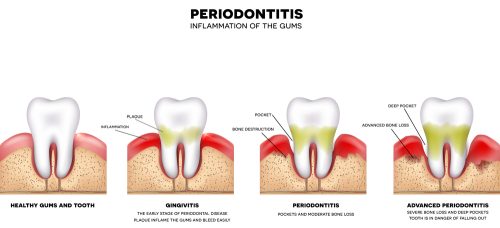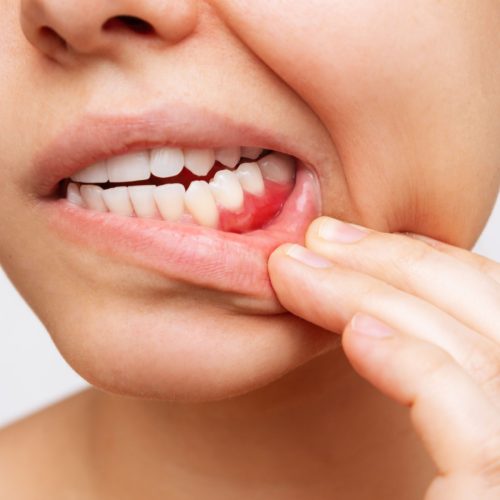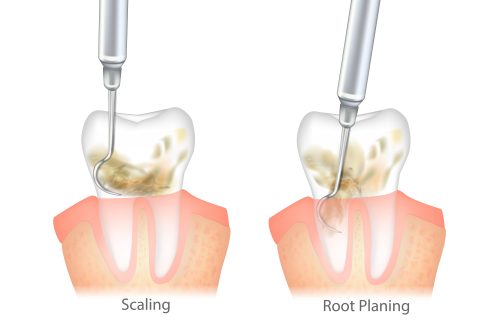Gum Disease in Houston, TX
Understanding Gum Disease: A Common & Serious Oral Issue
Are your gums tender, swollen, or
What is Gum Disease?
Gum disease, also known as periodontal disease, is a chronic inflammatory condition that affects the gum tissue and bones supporting the teeth. It’s primarily caused by the buildup of dental plaque, a sticky film of bacteria forming on the teeth. If the disease progresses, periodontal disease can lead to tooth loss and other serious health complications.
Stages of Gum Disease
Gingivitis
The earliest stage of gum disease, called gingivitis, is characterized by red, swollen, and bleeding gum tissue. At this stage of disease progression of periodontal disease, the condition is reversible with proper oral hygiene and professional cleanings.
Mild Periodontitis
Mild periodontitis is a stage of periodontal disease that occurs due to untreated gingivitis. The gums begin to pull away from the teeth, forming pockets that trap food particles and bacteria, leading to further gum inflammation and bone loss.
Moderate Periodontitis
Moderate periodontitis is a stage of periodontal disease characterized by increased bone loss and deeper gum pockets. At this early stage professional treatment is necessary to prevent further progression of the disease.
Advanced Periodontitis
Advanced periodontitis is the most severe stage of periodontal disease, where significant bone loss has occurred, and teeth may become loose or fall out. At this stage, aggressive treatment is required to save the remaining teeth.
Symptoms of Gum Disease
Some of the most common symptoms of gum disease include:
- Swollen, red, or tender gums
- Gums that bleed easily during brushing or flossing
- Persistent bad breath or bad taste in the mouth
- Receding gums, causing teeth to appear longer
- Loose or shifting teeth
- Pus between the teeth and gums
Risk Factors of Gum Disease
- Poor Oral Hygiene: Inadequate brushing, flossing, and not attending regular dental check-ups can lead to plaque buildup and eventually gum disease.
- Smoking and Tobacco Use:
Tobacco products can increase the risk of gum disease by causing irritation and reducing the body’s ability to fight off infection.
- Genetics: Some individuals may be more genetically predisposed to gum disease, making them more susceptible even with good oral hygiene habits.
- Hormonal Changes: Hormonal fluctuations during puberty, pregnancy, menstruation, and menopause can make gums more sensitive and prone to inflammation.
- Certain Medications: Certain medicines, such as antihistamines, decongestants, and antidepressants, can reduce saliva flow, which plays a crucial role in protecting the gums.
- Certain Health Conditions: Conditions like diabetes, HIV/AIDS, and autoimmune diseases can weaken the immune system, making it harder to fight off gum infections.
- Poor Nutrition: A diet lacking in essential nutrients, particularly vitamin C, can weaken the body’s ability to fight gum infections.
- Stress: Chronic stress can weaken the immune system and make individuals more susceptible to gum disease.
- Grinding or Clenching Teeth: Excessive teeth grinding or clenching can put extra pressure on the supporting tissues of the teeth, leading to gum recession and potential gum disease.
- Crooked Teeth or Dental Work: Misaligned teeth or improperly fitting dental restorations can make it difficult to clean effectively, increasing the risk of gum disease.
Common Gum Disease Treatments
Regular Dental Cleanings
Regular professional cleaning is essential for removing plaque and tartar buildup around the teeth and gums, which can lead to periodontal disease. During a professional cleaning, our dental hygienists will thoroughly clean your teeth to remove tartar and plaque from areas where a toothbrush and floss normally can’t reach. They’ll also provide personalized oral hygiene instructions besides simply brushing your teeth and flossing regularly.
Root Planing and Scaling
For cases of moderate to advanced periodontal disease, root planing and scaling may be recommended. This deep cleaning procedure involves removing plaque and tartar from around the teeth and gums, as well as below the gum line, and smoothing the root surfaces to discourage further plaque buildup.
Antibiotics
In some cases, antibiotics may be prescribed to help control the bacterial infection associated with periodontal disease. These can be in the form of oral medications or locally administered directly into the soft tissue around the gum pockets.
Gum Surgery
For advanced cases of gum disease with significant bone loss, gum surgery may be necessary. This can involve procedures such as flap surgery, bone grafting, or guided tissue regeneration to restore the support structure around the teeth.
How to Prevent Gum Disease
Prevention is still the best method when it comes to gum diseases. Our Houston dentists recommend the following to prevent periodontal diseases from occurring or recurring:
- Brush your teeth twice a day with a soft-bristled toothbrush and fluoride toothpaste
- Floss daily to remove plaque and food particles from areas your toothbrush can’t reach
- Use an antimicrobial mouthwash to help reduce bacteria in your mouth
- Quit smoking and chewing tobacco, as they increase your risk of gum disease
- Maintain a balanced diet rich in vitamins and minerals for oral health
- Visit our practice in Houston, TX, for regular dental cleanings and checkups
Frequently Asked Questions
Yes, gum disease has been linked to an increased risk factor of heart disease, stroke, diabetes complications, and respiratory issues. Maintaining good oral health is essential for well-being.
The duration of treatment depends on the severity of the condition. Early stages of gum disease may be reversed with improved oral hygiene and professional cleanings, while advanced cases of gum infection may require more extensive treatment over a longer period.
While gum disease can be effectively managed and properly treated, it cannot be completely cured. However, with proper treatment and diligent oral hygiene, the progression of the disease can be halted, and further damage can be prevented.
Gum disease itself is not contagious, but the bacteria that cause it can be passed from person to person through saliva. Practicing good oral hygiene and avoiding sharing personal items like toothbrushes can help prevent the spread of these bacteria.
Protect Your Smile: Schedule Your Gum Disease Consultation Today
Don’t let gum disease compromise your oral health and well-being. If you live in Houston, TX, or the surrounding areas of Pasadena, Sugar Land, or Pearland, we urge you to take action to protect your smile and learn how to keep your gums healthy with our experienced team at Dentistry of Highland Village. Call us today at (713) 360-7700 to schedule your consultation, and let us help you achieve a healthier, more confident smile that will last a lifetime.
MOST INSURANCES WELCOME AND MAXIMIZED!
NEW PATIENT SPECIALS & FINANCING OPTIONS AVAILABLE.
Contact us and schedule your visit today.
The Proof is in Our Patients




Specials & Offers
Ask About Our Specials
$159
Exam, x-rays, and regular cleaning
$59
Emergency exam and x-ray
| Monday | 7:00 AM – 5:00 PM |
| Tuesday | 7:00 AM – 5:00 PM |
| Wednesday | 7:00 AM – 5:00 PM |
| Thursday | 9:00 AM – 7:00 PM |
| Friday | 7:00 AM – 5:00 PM |
| Saturday | 7:00 AM – 3:00 PM |
| Sunday | Closed |



 Tobacco products can increase the risk of gum disease by causing irritation and reducing the body’s ability to fight off infection.
Tobacco products can increase the risk of gum disease by causing irritation and reducing the body’s ability to fight off infection.



